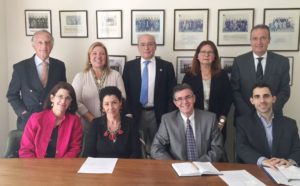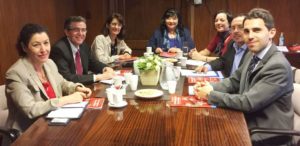Since its inception in 1967, BIREME is committed at improving and promoting free and equitable access to health sciences information published in Latin America and Caribbean and in the whole world, in order to enhance the quality of scientific output, as well as that of national health information systems.
This mission would not have been possible to achieve without the compliance, collaboration and enthusiasm of national, thematic and sub-regional Networks that work for the development and maintenance of sources of information, products and services, such as LILACS, DeCS, and the VHL, following the methodologies offered by BIREME.
These Networks form the ‘Latin-American and Caribbean System on Health Sciences Information’ which, after the launching of the VHL Model, in 1998, was simply named ‘VHL Network’ or ‘BIREME Network’.
VHL is the technical cooperation model for information management coordinated by BIREME and developed with the participation and collaboration of Networks, organizations and people from Latin America and Caribbean countries, and applied by other countries, such as Spain and Portuguese speaking African countries.
In the countries, VHL projects itself through national, thematic, and institutional instances, with the purpose of enhancing the visibility and promoting the use of scientific and technical knowledge according to health priorities and users’ information needs (researchers, technicians, managers, and students). Each VHL instance has a collaboration network and coordination committees (Advisory and Executive Committees).
Moreover, the Regional VHL integrates the current 107 VHL instances; a space assembling the collection of sources of information in the VHL regional index, currently comprising 35 databases totaling up 26 million bibliographic document references, 9.5 million of which have a link to the full text.
The VHL in Argentina
Completing 30 years in action, the Red Nacional de Información en Ciencias de la Salud (RENICS) from Argentina, which gathers about 80 academic libraries from universities and the government, and is coordinated by the  National Medicine Academy with the underlying support of the area of Knowledge Management of the country’s PAHO/WHO Representation. This alliance has enabled the development and application of the VHL model in one national instance, Argentina VHL, and four thematic instances: Pediatrics VHL, Nursing VHL, Psychoanalysis VHL, and Psychology VHL; and two institutional instances: Ministry of Health VHL and Health Department of Entre Rios Province VHL.
National Medicine Academy with the underlying support of the area of Knowledge Management of the country’s PAHO/WHO Representation. This alliance has enabled the development and application of the VHL model in one national instance, Argentina VHL, and four thematic instances: Pediatrics VHL, Nursing VHL, Psychoanalysis VHL, and Psychology VHL; and two institutional instances: Ministry of Health VHL and Health Department of Entre Rios Province VHL.
RENICS also regularly collaborates with registry of the literature published in the country in LILACS and in the Bibliografía Nacional de Información en Ciencias de la Salud (BINACS). Currently, approximately 100 titles of Argentinean scientific journals are indexed in LILACS, which makes Argentina ranks second as countries with the greatest contribution recorded in LILACS (after Brazil).
In contrast, the Network recognizes that it needs to strengthen its capacities and expand collaboration and participation of institutions in the VHL, LILACS, BINACS and other products and actions promoted by RENICS and BIREME in the country.
In this sense, BIREME has participated in Buenos Aires, on April 24 – 26, 2017, in a mission organized by PAHO/WHO Argentina to support the VHL initiatives and other projects related to RENICS and PAHO itself. Dr. Diego Gonzalez, director of BIREME, and Verônica Abdala, manager of Services and Sources of Information at BIREME, participated in several meetings and events. It is  worth mentioning such as: 14° Jornadas Argentinas de Bibliotecas de Salud y Ambiente, during the National Librarians Meeting in Argentina; Relaunching of Pediatrics VHL at the Sociedad Argentina de Pediatría; launching of the Ministry of Health VHL; meeting with the technical team of PAHO/WHO Argentina; and RENICS coordination meeting.
worth mentioning such as: 14° Jornadas Argentinas de Bibliotecas de Salud y Ambiente, during the National Librarians Meeting in Argentina; Relaunching of Pediatrics VHL at the Sociedad Argentina de Pediatría; launching of the Ministry of Health VHL; meeting with the technical team of PAHO/WHO Argentina; and RENICS coordination meeting.
Mr. Flavio Hazrum, of the area of Knowledge Management of PAHO/WHO Argentina, stated that “the VHL model continues evolving, and from Argentina, these efforts have been monitored with the migration of technological platforms to content management, training on the new decentralized contribution model proposed by BIREME, and inclusion of themes and knowledge displays related to the country’s technical cooperation priorities regarding the Sustainable Development Goals”.
Moreover, Mr. Hazrum stated that “the creation of the Virtual Health Library of the National Ministry of Health through an official resolution in 2016 is such an example; it uses the model proposed by BIREME as a repository of institutional memory of government health scientific and technical output, aiming to gather, record, preserve and disseminate the Ministry of Health’s academic, historical and cultural heritage”.